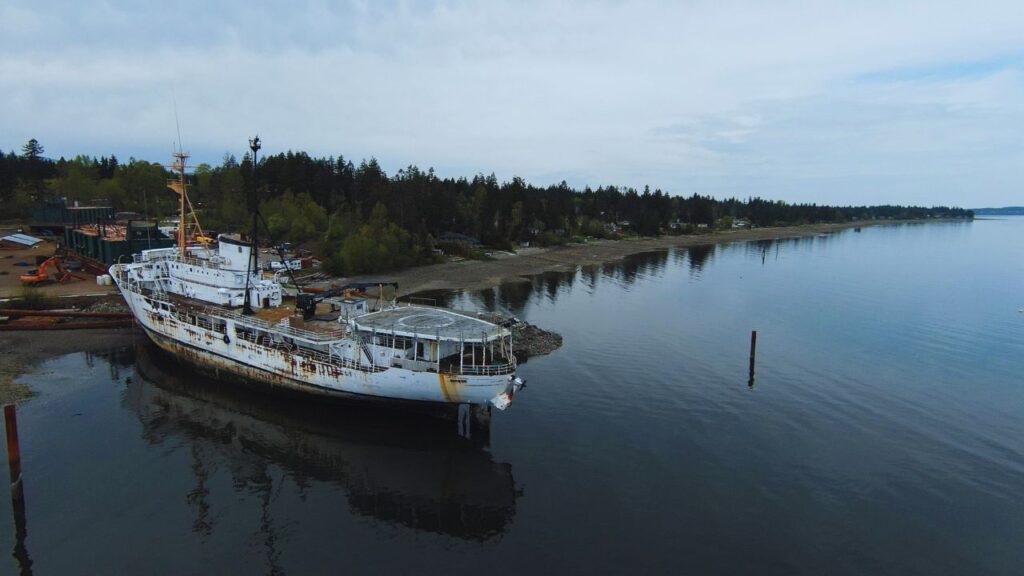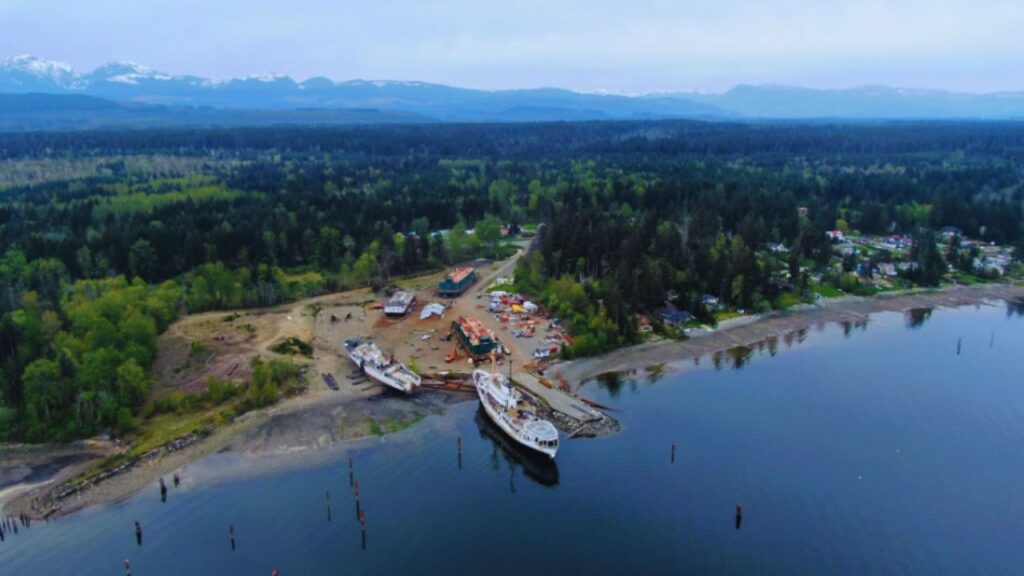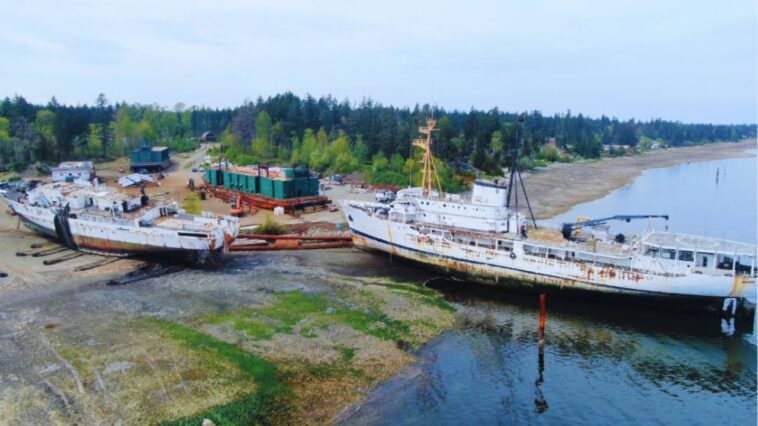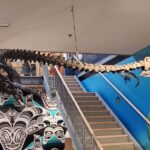Baynes Sound on the east coast of Vancouver Island is known for its abundance of seafood. It’s where 50% of BC’s harvested shellfish come from, and it also happens to be the location of the last commercial herring fishery in the Georgia Strait.
But locals are concerned that these fisheries could be harmed by the potentially toxic environmental impacts of another industry – the shipbreaking site at Union Bay. Since 2019, Deep Water Recovery has been dismantling large vessels and barges along the shore with little governmental oversight.
A group of concerned citizens gathered together to form the Concerned Citizens of Baynes Sound to voice their concerns about the lack of federal regulations around shipbreaking and the effects on the local ecosystem. Specifically, they are worried that unknown amounts of hydrocarbons, cadmium and raw sewage are being released into the water.
Last year, alarming drone footage of the Union Bay site with a leaking substance resembling oil entering the ocean was released.
“It’s an ecological area that needs protection,” said Ray Rewcastle, CCOBS president. “We pride ourselves on our shorelines. Why would we even allow this to happen?”
“It’s not something that should be done in an area like Baynes Sound.”
Ray Rewcastle, CCOBS president

Jurisdiction Confusion
The Deep Water site technically falls under the province’s jurisdiction, while the regional district monitors the upper beach region, and the vessels themselves are under the federal government.
“No one pays attention to what happens to ships when they die and have to be dealt with.”
Carrla Conkin, environmental lawyer
“The company has been capitalizing on the different levels of government and how they’re not coordinating with each other,” Environmental lawyer Carla Conkin told CBC.
There are international conventions that must be followed to properly dismantle large vessels, including ‘dry docking’ the ship on land to prevent toxic materials from entering the marine ecosystem.
“These guys are flying by the seat of their pants on the beach, basically dismantling major-sized vessels,” Conkin said to the CBC. “No one pays attention to what happens to ships when they die and have to be dealt with.”
Residents Rallied
Earlier this May, CCOBS and about 200 concerned Union Bay residents held a rally to raise awareness about the growing issue. “It’s not something that should be done in an area like Baynes Sound,” said Rewcastle at the time. “It should be done in an industrial port like the Port of Vancouver, Esquimalt, or Nanaimo.”
“Raw sewage and heavy metals like copper, lead, zinc, and cadmium that exceeded what’s allowable in B.C. waters were being discharged on site and ending up in the ocean.”
Tyee Report
The demonstration was just the latest step in a string of actions to bring in more oversight of Deep Water Recovery. In April 2022, Comox Valley Regional District filed a civil suit against the company to seek an order to prevent shipbreaking at the site due to zoning bylaw violations.
Deep Water responded in their legal briefing, saying they have complied with all regulations and that visiting officials confirmed “Deep Water’s compliance with the Zoning bylaw.”
Nevertheless, the BC Ministry of Environment has issued three warnings and one advisory against Deep Water for discharging waste into the environment under BC’s Environmental Management Act and Hazardous Waste Regulations.
According to a Tyee report, “raw sewage and heavy metals like copper, lead, zinc, and cadmium that exceeded what’s allowable in BC waters were being discharged on-site and ending up in the ocean.”
BC officials say they have also required the company to set up a monthly monitoring and sampling program to submit for further review.
“If required, the ministry will take further enforcement action to ensure compliance, including pollution prevention orders,” the Ministry said in a statement according to CTV. Yet, the latest reports show no action has been taken for the violations.
“You know the vessels are coming into Canada that couldn’t even be brought into Mexico or the United States because we have such weak regulations … And here you’ve got a company doing business in a community, and they have not gained social license.”
Gord Johns, the Courtenay-Alberni NDP MP who represents Union Bay

What’s next for Union Bay?
At the Spring rally, Gord Johns, the Courtenay-Alberni NDP MP who represents Union Bay, said the federal government is holding consultations until the fall on how Canada can better regulate shipbreaking operations.
“When it was raised that we don’t want to be a dumping ground for international vessels, it’s too late,” Johns said, according to CTV. “You know the vessels are coming into Canada that couldn’t even be brought into Mexico or the United States because we have such weak regulations … And here you’ve got a company doing business in a community, and they have not gained social license.”
In June, Johns also presented a citizen’s petition in the House of Commons for his “incredibly frustrated constituents from Union Bay who’ve become a test pilot for unregulated shipbreaking.”
The BC Ministry for the Environment says it continues to be in touch with the Deep Water site and is working with regulators “to ensure the environment and human health are protected,” according to a Tyee article published in April of this year.
The date has yet to be set for the Comox Valley Regional District and Deep Water case to reach the BC Supreme Court.





I have NO faith in the government agencies that should have immediately closed this third world operation . Where is EnvCan ? or DFO ? and why is the Shellfish industry keeping silent ? I am sorry I missed that last community meeting . I will endeavor to make the next one. It is unconsciously .